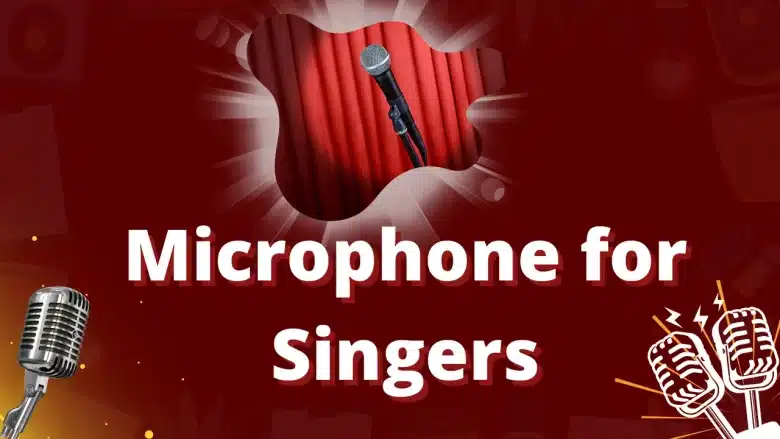Everyone’s voice is beautiful and special in their own way and using the best mic for singing will elevate your voice by amplifying and adding more effects to your voice. But if you are wondering as to which mic to choose and use, then this article is for you. Selecting the best mic for singing depends on several factors, like you need to choose a mic depending on your voice type (Bass, Baritones, Tenors, Countertenors, contraltos, Mezzo-soprano, Soprano), the environment upon which you want to use the mic, the acoustics of the room (treating the wall), the gears you’ll use with the mic.
Are you looking for a mic for live vocals or a studio mic for recording? If you are recording at your home for noise cancellation and pure reproduction of sound, use a carpet on the floor because it’ll be difficult to treat the ceiling of the room or you can use acoustic panels or use a booth with PVC piping clamped to the frame. Also don’t forget to soundproof the door, windows. Otherwise, the moment your volume is loud the room will sound bad even through a good mic. Now lets look into what to consider before choose a microphone. These factors will help you choose the best mic for live vocals or the best studio mic for vocals, depending on your needs.
Aspects To Consider While Choosing a Microphone
Understanding the technical aspects can help you find the best mic for singing that’s suited to your unique voice. Also keep in mind that after looking into the technical aspects, cost and ease of use also decides on choosing the microphone. Understanding your microphone technical spec will help you find the best condenser mic for vocals or a dynamic mic that suits your voice. Remember to choose your microphone according to your purpose which will explained later in this blog.
Clarity
The sound from the mic should sound clear and your prosodic, melodic contours should be preserved. The voice should not sound muffled. The noise which is added in addition should be filtered and a mic which can do better noise cancellation is preferred. Clarity is foremost important aspect if you are looking for best vocal mic for performances or recordings where vocal nuances are key.
Sensitivity
Sensitivity means the minimum detectable sound by the mic. If the number for sensitivity is low, it is preferred because of the precision in sound detection. A mic with high sensitivity may need less preamp gain. SPL (Sound pressure level) is another aspect to take into account, it is the maximum volume a mic can handle. The average SPL is 125 dB. It is a important factor to be consider if you are looking for a best studio mic for vocals.
Frequency Response
The balance between high, low, middle frequencies that the mic can pick up gives the frequency response. A microphone that picks up sound from all directions isn’t preferred because for many live performances they are prone to feedback and picking up unwanted background noise. Hence omnidirectional mics aren’t preferred for live performances. Unidirectional mic (cardioid/ hypercardioid/ supercardioid) can reduce noise from back and side.
Easy Equalization
Equalization helps to cut away unwanted/unnecessary frequencies and helps to make the frequencies in the recorded range to sound better by adding effects without affecting the timbre of voice.
Physical Aspects
While holding the mic for a longer duration, the singer shouldn’t feel tired. The distance between your mouth and the head of the mic plays an important role on how the mic picks up the voice. If the mic is dropped on the floor, the mic should be able to survive the drop. Mics should be able to handle varied climatic conditions as well
Wired or Wireless Microphone
Wired Microphones
Wired microphones have reliability and consistent audio quality, and of course, for not needing any battery power. They are considered to be very convenient for studio recording, live sound recording. But the problem with wired microphone is that the cable may get damaged or interfere with audio which results in disturbance.
Wireless Microphones
Since the wireless mics don’t require any wires, they offer flexibility and mobility as compared to the wired mic. But the challenges with wireless microphone are batteries need to be recharged or changed, wireless mics are costlier, they are sensitive to interference which affects the audio quality.
Avoiding Distortion and Feedback
Distortion is acoustic feedback, where the mic picks up its own audio output and creates a looping sound effect. Cupping the microphone will create unnecessary feedback. To avoid feedback and distortion is to use headphones or in-ear monitors.
Dynamic or Condenser Microphone
Condenser, Dynamic are the two most commonly used microphone types that are preferred for musicians. When choosing between a dynamic mic and a condenser mic, it’s important to know how each type works. The Condenser microphones creates audio signals using a capacitor (electrostatic principle).
Dynamic microphones uses inductance to generate an electrical signal (electromechanical induction). Dynamic mics are less sensitive to high SPL, rugged and hence they are more prominently used in live performances and recording loud sounds. Condenser mics are preferred for studio recordings since they capture a broader frequency range and the sensitivity is high so it is considering one of a best mic for studio vocals.
Some Microphone Suggestions for Home Studio
Before choosing a mic, look at their technical specification and check the frequency response, the type of the mic, Signal to noise ratio, compatibility with your operating system. Here are some of the mic suggestions which are well under the budget,
- Audio Technica ATR2100: This mic is a cost effective option and this mic can work with or without interface(It can be connected with xlr or can be used as a USB mic). It’s a dynamic mic so it doesn’t catch more noise so its a perfect mic for singing at home.
Audio-Technica ATR2100-USB Cardioid Dynamic USB/XLR Microphone
- Blue Yeti Mic: It’s a condenser usb mic and the output is softer and richer. But since it’s a condenser mic, it’s susceptible to outside noise. Also, it’s a bit more expensive but it’s a best condenser mics for vocals .
Blue Microphones Yeti USB Microphone for Recording,Streaming,Gaming,Podcasting
- Shure SM48S-LC: If the room isn’t well treated then this mic would be effective. It’s one of the best vocal mic. The mic is also well under Rs.6000 which makes it cost effective.
Shure SM48S-LC Vocal Dynamic Microphone, Cardioid
Some Microphone Suggestions for Live Recording / Professional Studio
- SE V7: Has better noise rejection and is easy to work with while mixing. It’s very well under the budget.
SE ELECTRONICS V7 Super cardioid Microphone for Speech
- Sennheiser e865 condenser mic: The e865 microphones deliver impressive clarity and handle high stage monitor levels without feedback, effectively capturing the performer’s natural sound without getting bogged down by technical issues.
SENNHEISER E865 Lead Vocal Condenser Microphone for Singing
- AKG C214 MIC: This microphone is best studio mic for performances. It features a cardioid condenser design that offers excellent feedback rejection for a clearer sound. Its effective cardioid polar pattern ensures strong off-axis rejection, allowing for maximum gain before feedback occurs and it’s one of good option vocal condenser mic.
AKG C214 Cardioid Condenser XLR Microphones (Grey)
Choosing the best mic for singing requires to know your unique voice type, performance setting, and the technical capabilities of the microphone. If you are a beginner singer or an audio engineer, it would be a bit tedious to choose the mic that matches with your requirements.
By taking into consideration the aspects that are mentioned in this article would help you choose a mic which is perfect for your requirement. And remember, whether it’s a condenser or dynamic mic, picking the right mic can make a lot of difference in elevating your vocal performance. Also keep in mind if you are setting up a studio, you need to consider treating the room for acoustics, sound card and other electronics that are needed should be chosen properly.
FAQs
What is a necessary specification of a mic?
A decent frequency response (80 Hz to 15kHz) and a very good sensitivity are important in choosing a mic.
How to choose a mic for singing?
Select a mic that’s fit for timbre and characteristics of your voice and also choose a mic in accordance to the environment that you use.
Which mic is preferred in live singing?
A dynamic mic is the best in a live show.
Do mics make singers sound better?
Certainly. Singing through the mic will enhance voice quality and the quality of the recording.
Related blogs: Easy Beginner’s Guide for a Voice Recording at Home Studio Set-up




























